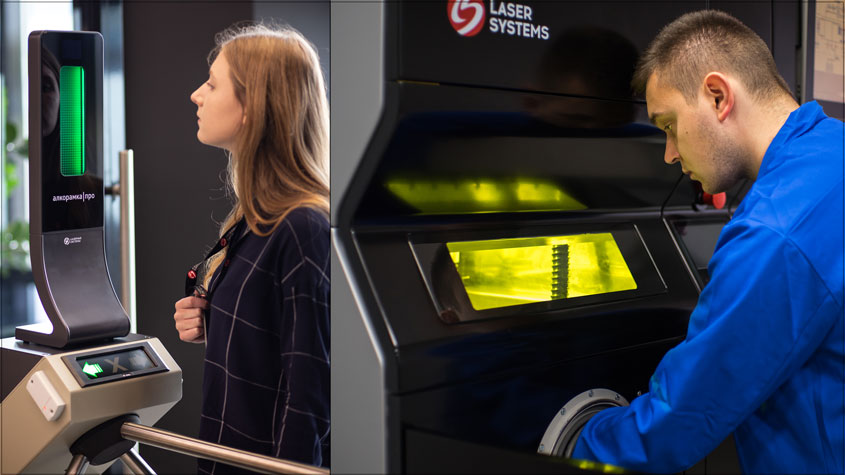JSC Laser Systems: Innovation as collateral for finance
JSC Laser Systems is a leading Russian producer of laser and optoelectronic equipment with a wide range of industrial applications, including meteorology, aviation, environmental safety, space research, and advanced additive manufacturing.
Established in 1998, the company has 180 employees, including a rich pool of highly qualified professionals with 20 years of experience in innovation and modern technology production. With ISO 9001 certification, JSC Laser Systems has a proven commitment to quality assurance.
The company offers a range of high-tech products, including lidar systems to monitor, measure, track and predict weather conditions (wind speed, turbulence, cloud cover, etc.) and other environmental phenomena.
In 2012, it extended its product line to include ALCOFRAME (Alkoramka in Russian), a contactless technology to check alcohol levels among personnel working in hazardous facilities rapidly (for example, mining operations, chemical and power plants), where intoxication poses a risk to human safety and the production system as a whole.
Upgraded in 2019, ALCOFRAME produces rapid test results and is now used in more than 1,000 companies in Belarus, Kazakhstan, and the Russian Federation. "Our new devices are more convenient. You just have to exhale in the direction of the alcohol frame. Within seconds, the device will analyze the employee's breath and produce the result in the form of color indication," explains Alexey Morozov, Director General of JSC Laser Systems. "The device is more hygienic, has a higher sensitivity, and requires minimal maintenance. It does not require calibration or the replacement of sensors and is equipped with a self-diagnosis system," he notes.

JSC Laser Systems focuses on developing additive technologies and the creation of innovative 3D printers to melt and fuse metallic parts, which are transforming manufacturing processes for the better and are now in demand in many industries. The company is also focusing on further improvement and expansion of its ALCOFRAME product line to ensure a high level of employee safety in factories.
In 2021, the company won several awards for its laser equipment from the Laser Association. It holds more than 100 various patents and certificates confirming the uniqueness of its technologies and equipment.
"Intellectual property (IP) protection has always been a vital part of the company's business strategy since many of its developments and solutions are unique, they have no analogs in the world, which is a significant strategic advantage among competitors," says Mr. Morozov.
Like many innovative, high-tech SMEs, JSC Laser Systems has faced difficulties in attracting funds and state support over its 20-year business journey. Innovative, R&D-based companies typically hold very few tangible assets that they can use as collateral to secure the funding they need to scale up their businesses.
However, in 2019, thanks to a new government funding mechanism for knowledge-intensive companies to develop their businesses, the company's fortunes changed. As part of a federal project − Expanding SMEs' Access to Financial Support, including Preferential Financing − launched by the Ministry of Economic Development of the Russian Federation, companies like JSC Laser Systems have been able to use their IP rights as collateral to secure funding.
Thanks to its robust IP portfolio of more than 100 patents, JSC Laser Systems was the first company to receive a loan under the scheme.
"Our commitment to building up our IP portfolio over the last 20 years paid off in 2019, when the Ministry of Economic Development launched its loan scheme. With our IP portfolio, we were able to secure a loan, which enabled us to develop and launch two new products to the market within 12 months despite all the challenges of the COVID pandemic," Mr. Morozov notes.
"The experience and skills we acquired in the process have also enabled us to sign commercial contracts for a new product line, which we will be launching later this year," Mr. Morozov says. The company is now advising other entrepreneurs on leveraging their IP assets through its participation in various business associations and forums.

By enabling SMEs like JSC Laser Systems to use their IP assets as collateral to secure the funding they need, the program gives new impetus to the development of knowledge-intensive industries in the Russian Federation. It is also helping to ensure a steady flow of new and improved technologies to the market.
Intellectual property is the cornerstone of many R&D-based SMEs, and its increasing recognition as an asset against which it is possible to secure financing is a significant step forward in supporting the development of innovative technologies.
"Our experience has shown that targeted support from the government in the field of IP is essential. The market has been waiting for it for a long time. The scheme is a positive step, but there is still much to be done to support the development and growth of high-tech businesses like ours in the Russian Federation. We plan to continue using IP for the development of our business," says Mr. Morozov.